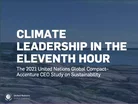Sustainability in business: What CEOs are actually saying

The world’s largest CEO research study on sustainability, the UN Global Compact-Accenture 2021 CEO Study talked to more than 1,200 CEOs across 113 countries and 21 industries who shared their perspectives on the private sector’s current and future climate resilience initiatives.
1 Climate change is impacting supply chains for half of businesses
Businesses are experiencing for themselves the damaging effects of climate change. Nearly half (49%) of CEOs report that supply chain interruptions due to extreme weather events are a top risk for them. They are navigating increased frequency of natural disasters and this is creating an urgent need to adapt and build resilience, particularly across supply chains. Taking bold action, 64% of CEOs say they have begun diversifying their material inputs in products and operations with 63% geographically diversifying their workforce and operations.
2 Most firms are developing new sustainable products and services
Supply chain interruption isn’t the only impact of climate change that’s forcing businesses to take action, however. Pressure is increasingly mounting from investors to enact change. A third of CEOs cite investors as among the most influential stakeholders to manage future sustainability efforts, compared to just 18% in 2016. Such impacts are proving a wake-up call to CEOs with four out of five CEOs (81%) already developing new sustainable products and services and three-quarters deploying new and circular business models.
3 Not enough companies have set science-based targets
While more than half (57%) of CEOs believe they are working towards a 1.5°C temperature rise, in line with the Paris Agreement, very few (just 2%) have actually set science-based targets – validated by the Science Based Target Initiative.
4 Managing net-zero business models is a struggle
As CEOs transition to net-zero business models, some report they are struggling to manage scope 3 GHG emissions. While 65% of CEOs say they have already started advancing net-zero business models, only 16% are at an advanced level. And while more than half (55%) have begun measuring and reporting scope 3 GHG emissions, just 16% are doing so at an advanced level.
5 Technology is enabling new business models
CEOs agree that technology is enabling new business models and will unlock the future of industry decarbonation. But to fulfil technology’s promise, CEOs will need effective data management across the value chain and must overcome affordability and knowledge constraints. More than half of CEOs cite the affordability of technologies as a critical barrier to efforts, while 53% report struggling to understand which technologies can enhance their credentials. And 63% of CEOs says that the difficulty in measuring ESG data across the value chain is a continued barrier to sustainability.
6 Policy makers must take critical actions
With just 18% of CEOs believing that governments and policymakers have given them the clarity needed to meet their sustainability goals, they are asking for five critical policy actions. To align Nationally Determined Contributions (NDCs) on the pathway to limit global temperature rise to a 1.5° warming trajectory; to enhance global cooperation on carbon pricing mechanisms aligned with the Paris Agreement; to meet and exceed the US$100bn commitment in climate financing goal for the Global South; to establish common standards for biodiversity protection and pathways for nature-based solutions; and to increase business engagement in climate policy formation for collaborative climate action.
7 Transformational companies have begun diversifying operations and workforces
The transformational companies and leaders are the ones demonstrating behaviours that are critical to achieving a competitive advantage from sustainability and it’s these firms and leaders who are already diversifying their operations and workforces. Nearly three times as many transformational CEOs say they are advanced in diversifying material inputs required for products and operations and in assessing and disclosing climate-related financial risk, while twice as many say they are advanced in designing resilient infrastructure and in R&D investment for climate-resilient solutions. These transformational companies are also shifting from fossil fuel use faster and reskilling their workforce in sustainability with almost twice as many transformational CEOs saying they are advanced in their journeys to divest from existing fossil fuel investments.



